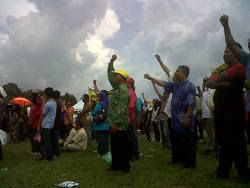Living on borrowed overtime
Technorati tags: Politics, Revolution, Middle East, Malaysia
First it was Tunisia, then Egypt, and now Libya.
We surely live in interesting times. What’s happening in the Middle East is something unprecedented in our lifetime. Okay, so revolutions and revolts aren’t novel or new phenomena, by any measure, but who’d have thought before this that these decades-old Middle Eastern dictatorships could fall within days?
Tunisia saw the ousting of Zine El Abidine Ben Ali within a month after a mass uprising was sparked by the self-immolation of Mohamed Bouazizi on December 17, 2010. Then it was Egypt, which ousted Hosni Mubarak in just over 3 weeks after the beginning of the January 25 Revolution.
After Egypt, we now have the people of Libya revolting against their leader Muammar Gaddafi, whose official title is Brotherly Leader and Guide of the First of September Revolution of the Great Socialist People's Libyan Arab Jamahiriya. True, Brotherly Leader did bring much good change right after he overthrew the monarchy.
Over the years, however, the initial good evolved to become a governance where dissent was made extinct, through any means necessary. Libya, after almost 42 years of Gaddafi had just about enough.
What we’re seeing is now a people rising up against a leader that has certainly over-stayed his welcome. And like Ben Ali and Hosni Mubarak before him, Gaddafi’s days look pretty much numbered.
(some parallels to concern us, and more, in the full post)
And the unrest doesn’t just stop at Libya. Protests have erupted throughout the Middle East, in Yemen, Jordan, Bahrain, and most recently, Oman, albeit on scales smaller than in Libya, Egypt and Tunisia.
The specifics of each of the three revolutions are, of course, different. But there are commonalities: state suppression of the people’s voice, alleged corruption, and an economy where what’s controlled by the elite have failed to trickle down and benefit the citizenry at large.
But the most striking commonality: all three of these nations has had leaders who have over-stayed their welcome, living on borrowed overtime, so to speak. And that realization brings us back squarely home to Malaysia, that has been under the rule of (pretty much) the same coalition ever since she gained independence in 1957.
When Mubarak fell, Malaysia’s Prime Minister Najib Razak was quick to say that such revolutions will not be allowed to happen here (via The Star). Frankly, Walski would not want the same kind of revolution here either. And in all likelihood, the exact same kind of revolt here is unlikely.
Not to say that there isn’t any dissatisfaction among the populace. There definitely is, covering many areas of discontent.
The selective suppression of expression practiced by the Government is not going to endear Malaysia’s citizens. On the one hand, the police came down heavily on protests (via The Malaysian Insider) against the controversial book Interlok on Sunday (links to an article in The Nut Graph).
 On the other hand, an estimated 10,000 people were allowed at a Perkasa rally in Perak last Friday (via The Malaysian Insider). No police action, no water cannons, and no tear gas. The event probably obtained a police permit, too, something that the Interlok protest was refused.
On the other hand, an estimated 10,000 people were allowed at a Perkasa rally in Perak last Friday (via The Malaysian Insider). No police action, no water cannons, and no tear gas. The event probably obtained a police permit, too, something that the Interlok protest was refused.
Granted, Walski personally thinks that the Interlok protest was unnecessary. Still, the clear disparity in how both were handled is very glaring.
Strong-arm police action on the one hand, and quiet permissiveness on the other. And as we have seen time and time again, police action is what makes these peaceful protests turn ugly. So, why the double standards?
It seems like any sort of rally that doesn’t have the participation of parties not critical of the government is automatically disallowed. But when it comes to the likes of Perkasa, and organizations speaking the same rhetoric as them, it’s almost guaranteed card blanche. Whether the observation that Perkasa is doing UMNO’s dirty work is true or not is secondary. There is a real fear when it comes to this very loud organization.
When news organizations report in a way that doesn’t tickle UMNO/BN’s fancy, you can be certain that show-cause letters, among other actions, can’t be far behind. But Utusan, on the other hand, can print just about any innuendo they wish, even things inflammatory and untrue, without as much as a slap on the wrist.
More and more, Walski is seeing signs that there are concerted attempts to silence dissent against the status quo, rather than address them coherently and intelligently. The proposed guidelines on Internet media that’s been talked about of late is one sign. Bear in mind that in the case of the Egypt and Libyan revolts, the Internet (and later mobile communications) was the first target of governmental shutdown. Are we going to see the same here?
Walski agrees with Najib that such revolutions need not happen in Malaysia, as we have processes in place for change in government, should it come to that after a future general election. But Egypt had similar processes as we do today when the British relinquished rule over the state. These processes, however, have slowly been dismantled over time.
And so when the mechanics of responsible democratic governance start to get tampered with, there is very real reason to be concerned. Already the separation of powers within our own government has become diluted, if not entirely non-existent. Similarly, the concept of a politics-neutral civil service is fast becoming fiction in Malaysia.
All that has happened in our own nation leads us to this question: should the rakyat no longer want to be under the rule of Barisan Nasional, will the ruling coalition make way gracefully?
Or, will they insist on staying in power, no matter at what cost?
It is somewhat worrying that UMNO Youth has recently embarked on para-military training for its members. Also worrying is that there are plans for the volunteer civilian militia, Rela, to grow in size significantly in the near future. And no one seems to be willing to divulge exactly why.
Tunisia, Egypt, and soon, Libya, have learned a lesson that living on borrowed overtime is not something tenable. Every citizenry has its breaking point, as we’ve seen in the three North African Arabic nations, and when that point is reached, there usually is no other option but for the leadership to go. Lest it gets ugly, like it has gotten in Libya.
And that ugliness is certainly not something that Walski would wish on anyone, much less on his own beloved nation.

















